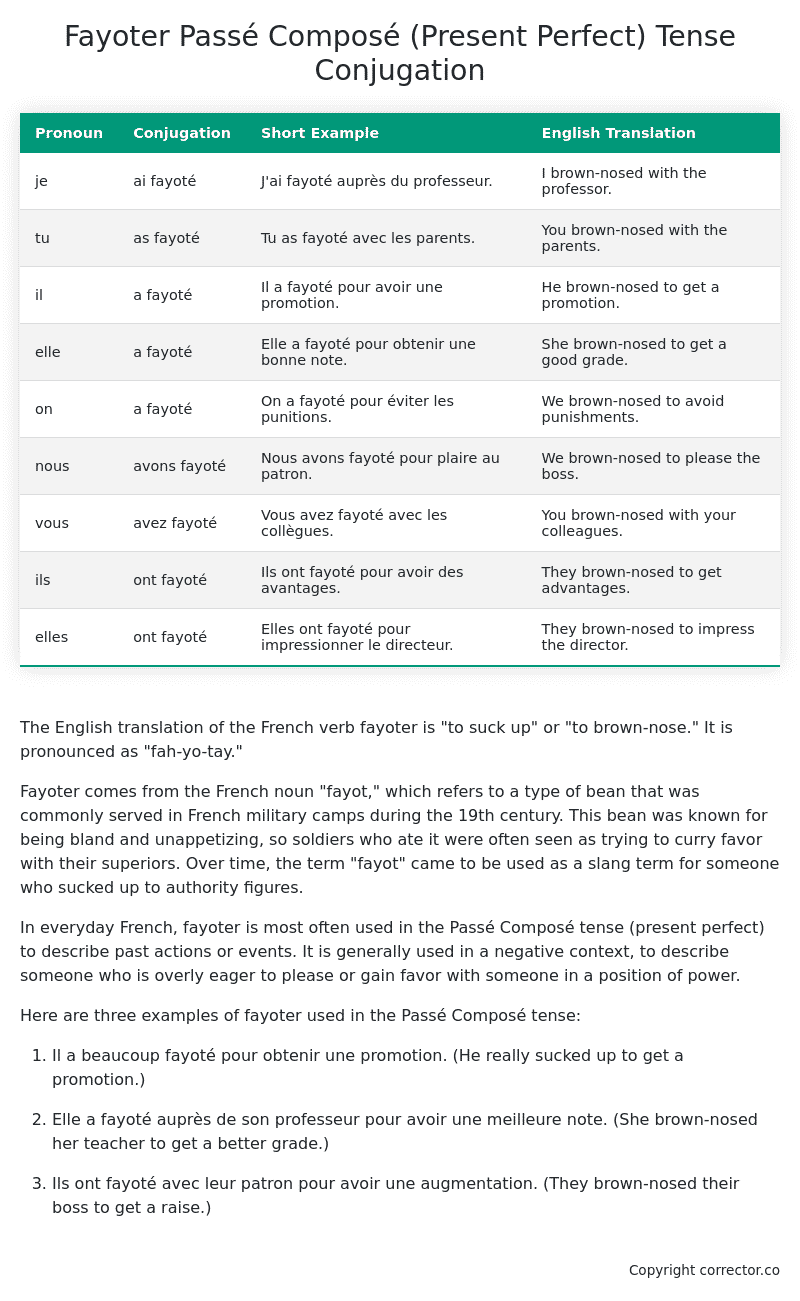Passé Composé (Present Perfect) Tense Conjugation of the French Verb fayoter
Introduction to the verb fayoter
The English translation of the French verb fayoter is “to suck up” or “to brown-nose.” It is pronounced as “fah-yo-tay.”
Fayoter comes from the French noun “fayot,” which refers to a type of bean that was commonly served in French military camps during the 19th century. This bean was known for being bland and unappetizing, so soldiers who ate it were often seen as trying to curry favor with their superiors. Over time, the term “fayot” came to be used as a slang term for someone who sucked up to authority figures.
In everyday French, fayoter is most often used in the Passé Composé tense (present perfect) to describe past actions or events. It is generally used in a negative context, to describe someone who is overly eager to please or gain favor with someone in a position of power.
Here are three examples of fayoter used in the Passé Composé tense:
-
Il a beaucoup fayoté pour obtenir une promotion. (He really sucked up to get a promotion.)
-
Elle a fayoté auprès de son professeur pour avoir une meilleure note. (She brown-nosed her teacher to get a better grade.)
-
Ils ont fayoté avec leur patron pour avoir une augmentation. (They brown-nosed their boss to get a raise.)
Table of the Passé Composé (Present Perfect) Tense Conjugation of fayoter
| Pronoun | Conjugation | Short Example | English Translation |
|---|---|---|---|
| je | ai fayoté | J’ai fayoté auprès du professeur. | I brown-nosed with the professor. |
| tu | as fayoté | Tu as fayoté avec les parents. | You brown-nosed with the parents. |
| il | a fayoté | Il a fayoté pour avoir une promotion. | He brown-nosed to get a promotion. |
| elle | a fayoté | Elle a fayoté pour obtenir une bonne note. | She brown-nosed to get a good grade. |
| on | a fayoté | On a fayoté pour éviter les punitions. | We brown-nosed to avoid punishments. |
| nous | avons fayoté | Nous avons fayoté pour plaire au patron. | We brown-nosed to please the boss. |
| vous | avez fayoté | Vous avez fayoté avec les collègues. | You brown-nosed with your colleagues. |
| ils | ont fayoté | Ils ont fayoté pour avoir des avantages. | They brown-nosed to get advantages. |
| elles | ont fayoté | Elles ont fayoté pour impressionner le directeur. | They brown-nosed to impress the director. |
Other Conjugations for Fayoter.
Le Present (Present Tense) Conjugation of the French Verb fayoter
Imparfait (Imperfect) Tense Conjugation of the French Verb fayoter
Passé Simple (Simple Past) Tense Conjugation of the French Verb fayoter
Passé Composé (Present Perfect) Tense Conjugation of the French Verb fayoter (this article)
Futur Simple (Simple Future) Tense Conjugation of the French Verb fayoter
Futur Proche (Near Future) Tense Conjugation of the French Verb fayoter
Plus-que-parfait (Pluperfect) Tense Conjugation of the French Verb fayoter
Passé Antérieur (Past Anterior) Tense Conjugation of the French Verb fayoter
Futur Antérieur (Future Anterior) Tense Conjugation of the French Verb fayoter
Subjonctif Présent (Subjunctive Present) Tense Conjugation of the French Verb fayoter
Subjonctif Passé (Subjunctive Past) Tense Conjugation of the French Verb fayoter
Subjonctif Imparfait (Subjunctive Imperfect) Tense Conjugation of the French Verb fayoter
Subjonctif Plus-que-parfait (Subjunctive Pluperfect) Tense Conjugation of the French Verb fayoter
Conditionnel Présent (Conditional Present) Tense Conjugation of the French Verb fayoter
Conditionnel Passé (Conditional Past) Tense Conjugation of the French Verb fayoter
L’impératif Présent (Imperative Present) Tense Conjugation of the French Verb fayoter
L’infinitif Présent (Infinitive Present) Tense Conjugation of the French Verb fayoter
Struggling with French verbs or the language in general? Why not use our free French Grammar Checker – no registration required!
Get a FREE Download Study Sheet of this Conjugation 🔥
Simply right click the image below, click “save image” and get your free reference for the fayoter present perfect tense conjugation!

Fayoter – About the French Passé Composé (Present Perfect) Tense
Formation of the Passé Composé
Set the auxiliary verb with either
Conjugate the auxiliary verb
Add the past participle
Common everyday usage patterns
Narrating Past Events
Sequential Actions
Describing Completed Actions
Interactions with other tenses
Imperfect Tense
Conditional and Future Tenses
Summary
I hope you enjoyed this article on the verb fayoter. Still in a learning mood? Check out another TOTALLY random French verb conjugation!


